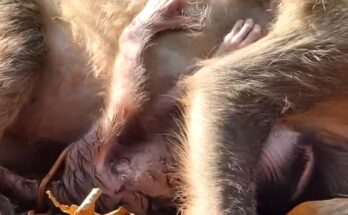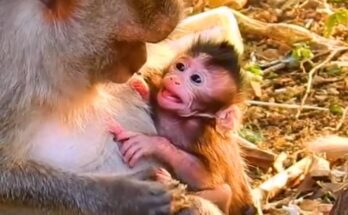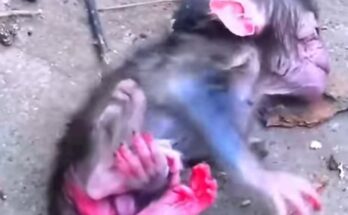In the heart of a dense tropical forest, where towering trees form a green canopy and the calls of birds echo through the branches, a tragedy unfolds. A newborn baby monkey, barely a few hours old, loses its grip on its mother and plunges from the safety of the treetops to the hard ground below. The tiny creature, fragile and helpless, now faces a desperate fight for survival.
A Perilous Fall
The newborn, possibly a langur, macaque, or another primate species, had not yet developed the strength to cling to its mother’s fur securely. In the chaos of the jungle—whether due to a sudden movement, a predator’s attack, or the jostling of branches—the baby lost its hold and tumbled down. The forest floor is an unforgiving place for such a vulnerable infant. With its soft bones and undeveloped muscles, the baby monkey lands awkwardly, dazed and in distress.
The mother, high above, hears its weak cries and looks down anxiously. Maternal instincts drive primate mothers to protect and nurture their young fiercely. But the situation is dire. If the fall has injured the baby, the chances of its survival drop significantly.
A Mother’s Dilemma
The mother monkey, distressed but cautious, descends slowly, scanning for dangers. The forest floor is home to opportunistic predators—snakes, wild cats, and birds of prey—all waiting for a vulnerable target. Other members of the troop may notice the mother’s distress, some showing concern while others remain indifferent.
In some cases, a mother may attempt to retrieve her baby, nudging it and vocalizing to encourage movement. If the newborn responds, hope remains. But if the baby is too weak or unconscious, the mother faces a heartbreaking choice: to stay and try to revive her infant or abandon it to survive herself.
The Harsh Reality of the Wild
Nature is both breathtaking and brutal. While humans might intervene in such situations, wild animals follow instinct. If the mother determines that the baby is too weak to survive, she may leave it behind, knowing she must focus on herself and her troop. Other monkeys might gather around briefly, inspecting the infant, but in most cases, they will move on.
However, there are cases where mothers refuse to let go. Some have been observed carrying their deceased infants for days, unwilling to accept the loss. In rare situations, other troop members—often older females—may step in to care for the orphaned baby. These acts of compassion show the deep emotional connections in primate societies.
A Glimpse of Hope
If the baby monkey survives the fall with only minor injuries, it has a chance. If the mother retrieves it, she will hold it close, keeping it warm and protected. The newborn will need immediate nourishment, primarily its mother’s milk, to regain strength.
Sometimes, luck is on the infant’s side. If human conservationists or wildlife rescuers are nearby, they may step in to provide medical care, increasing the baby’s chances of survival. Such interventions, however, must be handled delicately to ensure the monkey can later reintegrate into the wild.
A Symbol of Resilience
The fate of this newborn baby monkey is uncertain. Whether it perishes, is rescued, or miraculously survives on its own, its story is a reminder of the fragile yet resilient nature of life in the wild. Every day, animals face incredible challenges, and their survival depends on instinct, luck, and the laws of nature.


